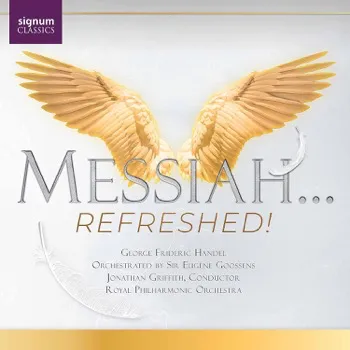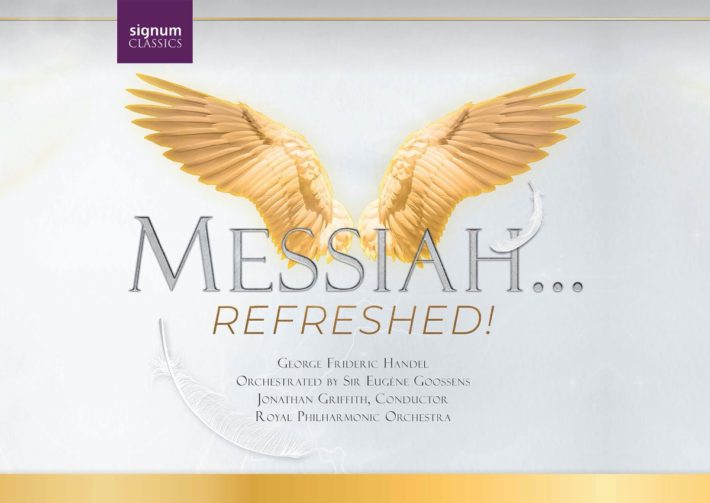Without a doubt, Handel’s Messiah is the most loved and performed sacred piece of music in the English language. Throughout the composer’s life, Handel tweaked it to fit various singers and performances. Others have re-orchestrated the work from Mozart (Charles Mackerras’ recording is recommended) to Sir Andrew Davis’ recent reworking. Eugene Goossens’ arrangement — the one presented here, dates from 1959 and was a commission from Sir Thomas Beecham.

Those familiar with Messiah will appreciate how careful Goossens has been in adapting the score for a modern symphony orchestra, providing a range of different timbres (I was repeatedly reminded of the BBC Philharmonic’s Stokowski’s Symphonic Bach album). Beecham recorded this arrangement with his orchestra — The Royal Philharmonic and Chorus – in 1959. This new Signum release is conducted by Jonathan Griffith, directing the same orchestra with a combined chorus of the National Youth Choir of Great Britain and The Jonathan Griffith Singers.
Griffiths instantly brings his own approach to pacing, especially in the choruses, not always in a manner that contributes positively to this version. By taking the choruses more broadly, he doesn’t allow the choir to shine as they should, drawing attention to some technical imperfections. The sound of the choir is warm, but lacks the tone or the rhythmic tautness of Beecham’s Royal Philharmonic Chorus. From the outset, intonation lacks security, prevailing the duration to the final “Amen”.
Blemishes are frequent, especially as the sopranos and the tenors rise. The slower pace of “He Shall Purify” draws attention to the insufficient agility in the choir’s passage work. Consonants at the end of words are occasionally untidy, especially “All We Like Sheep”. The most famous chorus is characterized by unusual pronunciation of “Hallelujah”, excessively stressing the third syllable, which is distracting and less interesting than Beecham’s more vivid reading. Throughout the final choruses — “Worthy is the Lamb” and “Amen”, momentum falters, blurring the distinction in Handel’s polyphony. There are more positive moments though, as in choruses such as “For Unto Us” and “Glory To God”, where the orchestration elevates the music, bringing an element of sunshine, even under Griffith’s slightly pedestrian pacing.
Griffith’s soloists don’t match the character of Beecham’s. Both of the male soloists disappointingly lack rhythmic clarity and direction in their passagework, missing the subtlety in the word-painting. Tenor John McVeigh begins with quite an idiosyncratic approach to word stress, most noticeably in “Every Valley Shall Be Exalted”, and also lacks the rhythmic precision of Jon Vickers in Beecham’s version. His diction is mostly clear, but like the choir, his consonants at the end of words are sometimes lacking. Bass Christopher Job has a dramatic voice overall. In “The People That Walk In Darkness” he can elongate the phrases in a musically convincing fashion, despite the overly-stately tempo. “He Shall Be Changed” has some peculiarities, which has parallels to those of McVeigh in part one.
Mezzo-Soprano Claudia Chapa clearly understands the role of the singer in oratorio. Her voice has sufficient projection into the lower registers, which brings a richness and draws parallels with Cathryn Wyn Rodgers in Harry Christopher’s recording, but with a darker and less-controlled tone than Dame Janet Baker. Soprano Penelope Shumate lacks the subtleties of Beecham’s soprano Jennifer Vyvyan. In “Rejoice Greatly”, the running semi-quaver passages suffer the same fate as those of her male counterparts. Shumate’s significant vibrato is noticeable throughout, becoming more of an issue in the slower arias such as “I Know That My Redeemer Liveth”, where the purity of line and tone is sadly compromised.
The Royal Philharmonic Orchestra do wonders with their accuracy and care in bringing this score to life, and in responding to Griffith’s unconventional tempos. The recording favors the soloists and orchestra over the choir, who is placed too far back in the acoustics of Abbey Road Studios. Harps and trumpets are placed at the extremes of the panorama, working better on loudspeakers than headphones. Overall, an interesting opportunity sold short; for a thrilling rendition try streaming (or purchase the highlights CD) Beecham’s vividly more colorful, exciting and aptly paced performance of this arrangement.
“Messiah…Refreshed!”
Handel (arr. Sir Eugène Goossens) – Messiah
Penelope Shumate, Soprano
Claudia Chapa, Mezzo-Soprano
John McVeigh, Tenor
Christopher Job, Bass-Baritone
The Jonathan Griffith Singers National Youth Choir of Great Britain
Royal Philharmonic Orchestra
Jonathan Griffith – Conductor




















